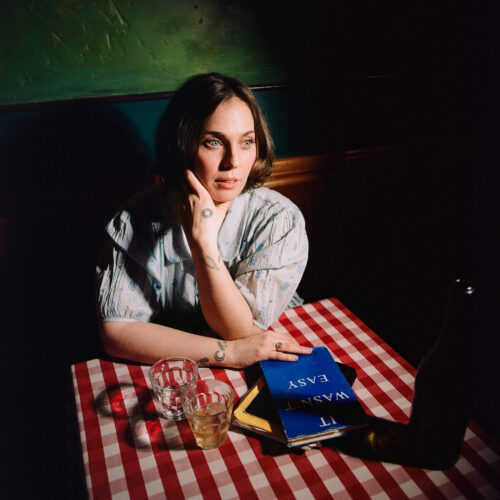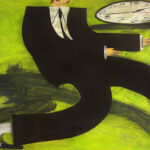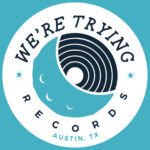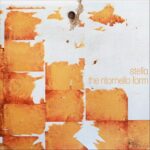Artist Interview: Meg Remy of U.S. Girls
Posted: by The Alt Editing Staff

Photo by Colin Medley
Toronto-based multimedia artist Meg Remy announces ninth U.S. Girls album Scratch It, out June 20 through 4AD, with an ambitious 12-minute single, “Bookends.” The track pays tribute to her late friend, former Power Trip frontman Riley Gale, through the lens of John Carey’s Eyewitness to History, a compilation of 300+ eyewitness accounts of events spanning from the death of Socrates to the first moon landing. Directed by Caity Arthur, the accompanying cinematic short explores death as the great equalizer.
After her breakthrough 2018 album, In a Poem Unlimited, Remy quickly acquired a mythological status, granting her infallibility from norms. Nearly 20 years into her career, Scratch It continues reaching into her endless bag of tricks, masterfully weaving together gospel, disco, and garage rock. Co-produced by collaborator and life partner Max Turnbull, she explores motherhood and idol worship with urgency and warmth.
What was behind your decision to kind of interchangeably perform as Meg Remy vs. U.S. girls? Do you have a preference? What kind of traits or experiences do you feel like each moniker unlocks?
The medium dictates it, and then the legality. It’s about the way I’m contractually bound by things. A lot of times, that decision isn’t mine. If I wrote a book, I’d put that under my name. Sometimes, someone will want me to do an improvised show but they don’t have any money. My booking agent would be like, “what the hell?” So I’d perform under Meg Remy because it’s not taking away from U.S. Girls. I can do the show and not have to charge someone a bunch of money.
You have more flexibility under your own name?
Yeah, plus one of my favorite things is confusing people. One of my favorite things is not making it too easy, so it helps to have multiple names to perform under. Plus it’s a little bit hip hop or something.
It took you 10 days to record Scratch It. Is this normal?
It’s not normal for me. Most records in the past were made in that amount of time, but this is definitely the fastest and most efficient way I’ve ever made an album. As a full-time parent, the amount of time I have to spend has changed, so I have to fit my work processes within that.
Do you think that’s changed the types of songs you write?
The time crunch hasn’t changed my songs, but the experiences of being a parent and being this age have.
What song was the hardest for you to write?
There were many different, hard paths with songs on this record. The one that I put the most time into worried about the most was “Walking Song.” I was trying to make a kind of riff on a class church hymn called “A Closer Walk With Thee.” That was a delicate thing because I wasn’t trying to make any sort of critique on Christianity. I didn’t want to disrespect anyone while also using the form and flipping the script on those words to make a song that’s sex-positive. I’d say that song was the most challenging because I was trying within an existing form.
You played a lot of unreleased songs at SXSW. Have you done this before? If so, how does this inform your creative process?
Yeah, we played some of those songs at two New York shows in December. South By was the first time we played a song that we’d never played before, which was from a film that I scored that also premiered at South By. That was a little bit scary, but also when you’re playing things that no one knows, it could sound like anything, right? So if you screw up, no one knows. You have to puff yourself up for that because if you have fans there, they may be disappointed hearing a bunch of tunes they don’t know. But I found it freeing and exciting. The performative element gave me a nice edge.
What prompted the decision to trade computer-based production for something more analog?
I started to work with this band from Nashville and that’s how they work. They record live to tape, and I had never done that. I’d recorded live, but never to tape. I wanted to try that and they encouraged me. As well as the time thing, again – being a parent and having a lot of other things going on in life. They reassured me we could make a record in 10 days. They’ve made records in three days. That was the amount of time and I had to commit to it, but it was plenty.
You have a few tributes to artists on Scratch It, whether by name or sonically. How did you toe the line between paying tribute and telling your own stories?
I don’t know. You’d have to say if I did that or not. That’s not for me to decide. It was not something I consciously thought about until after when I was like, “okay, I got James Brown on there.” Then, I wondered if I did too much of that. But I love music and culture. People now have access to the whole history of recorded and sheet music, so it felt very natural. No one’s original anymore. We’re always paying tribute and referencing someone. It felt very transparent for me. I’m very much made up of the things that I love and worship, like a giant bulletin board. It worked for me. Maybe it could be seen as slightly cartoony, but I don’t mind it.
You talked about this earlier, but you scored your first movie. Can you just give a summary of Dead Lover for the uninformed?
The main character, Grave Digger, is a gravedigger and comes from a long lineage of gravediggers. She can’t find a lover because she smells like rotting corpses, so she’s trying to make a perfume to make herself smell better. It doesn’t work. She ends up meeting what becomes her lover, who then dies. The only part left of him is his finger, which she uses to try and resurrect him. It’s basically a Frankenstein story. It’s an incredible film. It’s very layered. It’s very grotesque. It has a lot to say about love and desire and gender and hope.
Why do you think you were a good fit to score it?
The director, Grace Glowicki, and I are very similar. We’re really into collaboration, the unconscious, and collaging. She reached out to see if I was interested. I saw the film and loved it. It was pretty apparent once we started working together that it was a good fit. We just had chemistry. We think about things in the same way, we’re playful. Turns out, we live near each other in Toronto. I learned a lot from her about films and I think that I taught her things about music. We both were bringing our own experiences to the table and supporting each other in our respective roles.
How did you approach the scoring process?
I came on at the beginning of November and the film premiered at Sundance in January, so the approach was dictated by time and budget. There wasn’t much of either. We used a lot of free public domain recordings that already exist. I also went through my hard drive and pulled scraps of things I’d already made. Why make something new when we can go through this library of music and pull things? Your ego wants you to make new things and so that you can say, “I scored this whole film and I made all these new things,” but it wasn’t necessary. The approach to it was “by any means necessary,” that fits the limitations and hits the deadline while thinking outside the box. I thought a lot about silence and how that can be a sound, too.
If you were to score a film again, what would you do differently?
I would have better file management and name things so I could find them. I would clarify in advance if the film was edited to attempt score, which I didn’t know before I started. It makes a big difference when edits are cut to the BPM of a song.
Has the political climate impacted the music you make? If so, how?
The biggest way it’s impacted my music is through the choices I have to make around economics. I want to do everything that’s the opposite of how politics run, which is hard ’cause I work in an industry that’s run on PR. I want to be an antidote to this. I’ve gotten less outwardly political compared to my previous albums, but I actually think it’s more political because I think the most political thing one can do is get to know themselves. You are the only person that you can really change. I’ve tried to dig into myself, not just in my music and art, but in my life work – being in therapy, trying to be honest with myself, and work on relationships. The political climate has made me retreat into myself more.
Do you have any habits or routines that help you access these parts of yourself?
Yoga helps when I can stick with it, but that’s hard when touring. Any kind of routine helps, like reading or taking a walk at the same time every day. I love cooking – the act of acquiring the ingredients and putting a lot of care and thought into food.
How do you stay grounded when you’re on tour?
I don’t know if I do. Performing keeps me grounded. I perform without shoes on, which keeps me grounded literally and spiritually. I try to take my shoes off in general, like at a rest stop, and putting my feet in grass to connect. I love putting my hands over my head and touching my toes, even if I’m not doing a full stretching routine, just getting embodied for moments instead of sitting in a car, arriving somewhere, and ordering food.
What did you watch, read, and listen to while writing Scratch It?
The main book I read was called Eyewitness to History, which is a collection of eyewitness accounts from over a thousand years or something. I highly recommend it. I watch so many movies, but I don’t really watch TV at all. My husband and I watch multiple movies a week. I couldn’t even tell you what I watched. There’s too much. I listened to this record by Cass Richards called New Love Meditation. I was really inspired by that record because it was rock trio-style. I loved listening to stripped-down drum, bass guitar, and singing. I knew I wanted to try that. There’s a record by Bria Salmena called Big Dog. I got to work on that record and I listened to it a lot. That was a big inspiration to Scratch It.
Find Meg Remy on Instagram, and preorder Scratch It.
––
Giliann Karon | @lethalrejection
The Alternative is ad-free and 100% supported by our readers. If you’d like to help us produce more content and promote more great new music, please consider donating to our Patreon page, which also allows you to receive sweet perks like free albums and The Alternative merch. And if you want The Alternative delivered straight to your inbox every month, sign up for our free newsletter.










